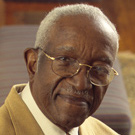 Duke University in Durham, North Carolina, has announced a year-long series of event to celebrate the 100th anniversary of the birth of John Hope Franklin. Professor Franklin was the James B. Duke Professor Emeritus of History at Duke University and one of the most prolific and respected historians of the twentieth century. He died of congestive heart failure on March 25, 2009 at Duke University Hospital. He was 94 years old.
Duke University in Durham, North Carolina, has announced a year-long series of event to celebrate the 100th anniversary of the birth of John Hope Franklin. Professor Franklin was the James B. Duke Professor Emeritus of History at Duke University and one of the most prolific and respected historians of the twentieth century. He died of congestive heart failure on March 25, 2009 at Duke University Hospital. He was 94 years old.
The university has set up a special website that will provide information on the year-long celebration. “On this, the 100th anniversary of John Hope Franklin’s birth, we celebrate the life of a national hero. Born at the height of Jim Crow oppression, he embodied the struggle of black Americans to steadfastly resist white racism,” said William Chafe, Duke history professor emeritus and co-chair of the centenary organizing committee. “No one did more to focus attention on the fundamental contradiction between racism and democracy, and in this year of his centenary, we celebrate — and remember — all he did to make us live up to his dream of racial justice and dignity.”
John Hope Franklin was born in Rentiesville, Oklahoma, in 1915. His grandfather had been a slave. His father was one of the first black lawyers in Oklahoma. His mother was a schoolteacher. Franklin was named after John Hope, the former president of Morehouse College and Atlanta University.
Franklin attended racially segregated schools in Oklahoma. He was valedictorian of his high school class. He wanted to attend the University of Oklahoma but at that time, and for many years later, the state’s flagship university was closed to blacks.
In 1931 Franklin enrolled at Fisk University in Nashville, Tennessee, with the intention of studying law. However, at Fisk, Franklin became a history buff under the mentorship of White professor Theodore Currier. After Franklin graduated from Fisk, Currier lent him the money to pay for graduate study at Harvard University. Franklin earned his master’s degree in 1936 and his doctorate five years later in 1941.
 After completing his dissertation, Franklin taught at the North Carolina College for Negroes, now known as North Carolina Central University in Durham. In 1947 Franklin was named to the faculty at Howard University in Washington, D.C. While there he worked with Thurgood Marshall and the NAACP Legal Defense Fund working on briefs for cases that included Brown v. Board of Education. That year he also published the textbook From Slavery to Freedom which is still in print and has sold more than 3 million copies.
After completing his dissertation, Franklin taught at the North Carolina College for Negroes, now known as North Carolina Central University in Durham. In 1947 Franklin was named to the faculty at Howard University in Washington, D.C. While there he worked with Thurgood Marshall and the NAACP Legal Defense Fund working on briefs for cases that included Brown v. Board of Education. That year he also published the textbook From Slavery to Freedom which is still in print and has sold more than 3 million copies.
In 1956 John Hope Franklin landed a teaching position at a predominantly White educational institution. He was hired to chair the department of history at Brooklyn College in New York.
In 1964 Franklin was hired to the faculty at the University of Chicago. He remained there for 16 years before accepting a position at Duke. He later spent seven years on the faculty of Duke Law School. He retired from teaching in 1992.










